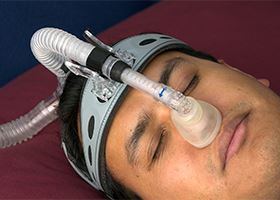Up to 70 million U.S. adults have a sleep disorder, according to the American Sleep Association. Identifying and treating sleep disorders using technology is a rapidly growing area in the health care field. As a polysomnographic technologist, you will work with physicians to identify, diagnose and provide treatment for sleep disorders such as sleep apnea and insomnia. The OCC Career Advantage associate degree program prepares you to enter the field, and can also provide cross-training options for neurodiagnostic and respiratory care technologists. If you see yourself helping others improve their quality of life through a good night’s sleep, read on to learn what training OCC has to offer in this important, growing health care career.
A sampling of courses for these careers
- Medical Terminology
- Polysomnography Basics
- Pulmonary Pathology
- Respiratory Anatomy and Physiology
- Abnormal Psychology
- Applied Pharmacology
WANT TO LEARN MORE?
-
PROGRAM LENGTH
-
COST/FINANCIAL AID AVAILABILITY
-
JOB WAGE OUTLOOK
-
SCHEDULING OPTIONS
Complete one of our associate degree programs, and you'll be well-prepared to enter a career in polysomnography technology.
- IN LESS THAN 2 YEARS EARN: CERTIFICATE OF ACHIEVEMENT
- OR EARN YOUR ASSOCIATE DEGREE IN UNDER 4 YEARS
View program details in course catalog
Polysomnography
Prepare individuals for entry-level employment opportunities as professional and competent Polysomnographic Technologists.
View program details in course catalog
Polysomnographic Technology
Prepare for an entry-level position as a polysomnographic technologist, working in a profession that diagnoses and treats disorders of sleep and daytime alertness. Learn to operate a variety of sophisticated electronic monitoring devices that record brain activity, muscle and eye movement, respiration, blood oxygen and other physiological events. This program accepts new students to begin in the fall semester of odd years.
Frequently Asked Questions
Other Programs That Might Interest You

CARDIOVASCULAR TECHNOLOGY
Earn a certificate of achievement or an associate degree to enter this high-paying field.

NEURODIAGNOSTIC TECHNOLOGY
Earn an associate degree to enter this field or choose our specialization certificate to upgrade an existing credential
Did you know?
According to the Bureau of Labor Statistics, people who have a certificate as
their highest level of education earned, on average, 20 percent more than
those whose highest education level is a high school diploma.






